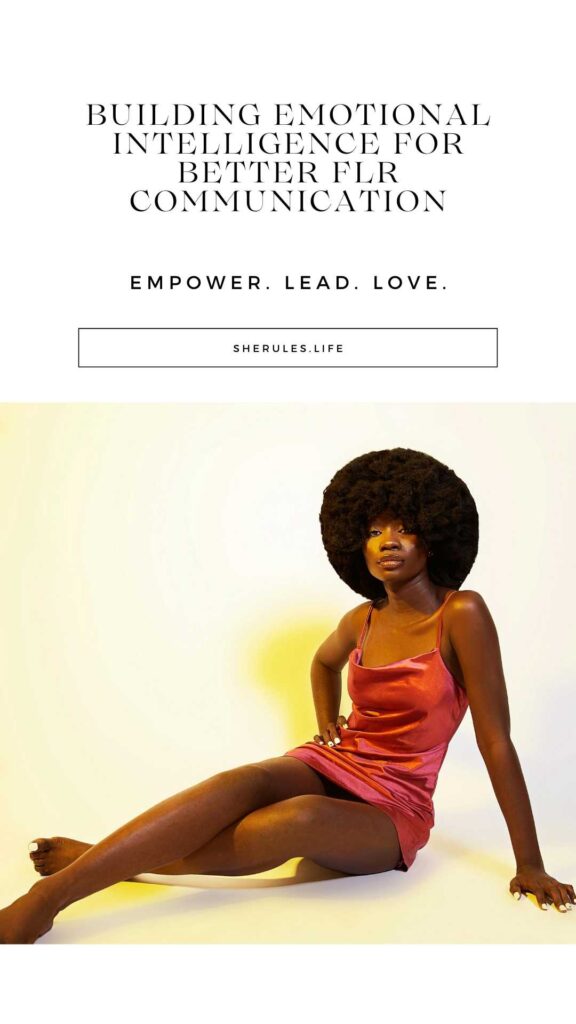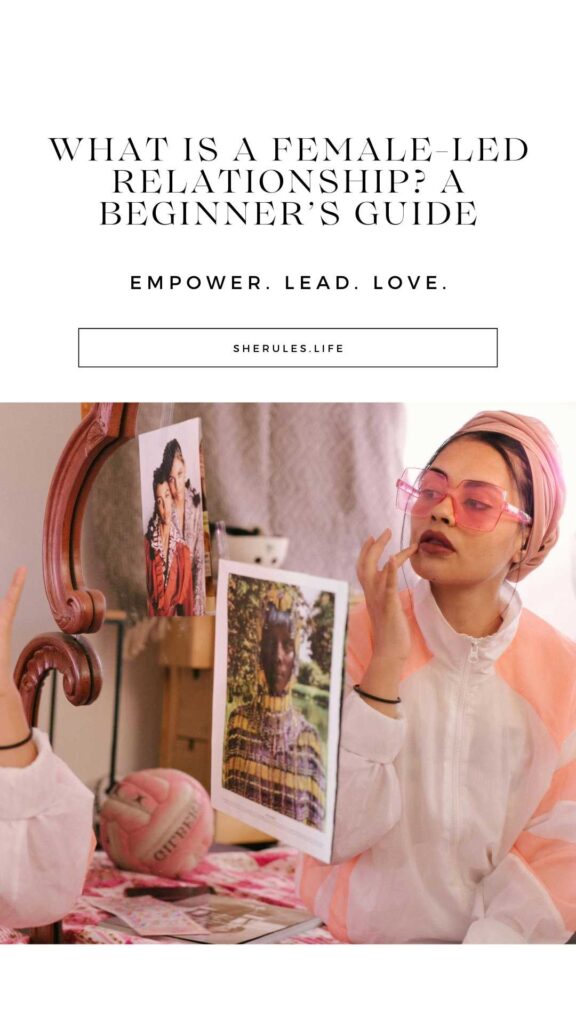
Today, we’re diving into a topic that’s close to my heart and crucial for the success of any relationship, especially FLRs- emotional intelligence and its role in communication.
As women taking the lead in our relationships, it’s essential that we develop and nurture our emotional intelligence.
This skill not only helps us understand and manage our own emotions but also allows us to better connect with our partners, creating a harmonious and fulfilling FLR.
So, let’s explore how we can build emotional intelligence to enhance communication in our female-led relationships.
Understanding Emotional Intelligence
Before we delve into the specifics, let’s clarify what emotional intelligence actually means. Emotional intelligence, often abbreviated as EQ, is the ability to recognize, understand, and manage our own emotions, as well as the emotions of others.
It’s about being aware of feelings – both our own and those of the people around us – and using this awareness to guide our thoughts and actions.
In the context of FLRs, emotional intelligence plays a pivotal role in fostering open, honest, and effective communication. It helps us navigate the unique dynamics of our relationships with grace and understanding.
The Five Components of Emotional Intelligence
Psychologist Daniel Goleman, who popularized the concept of emotional intelligence, identified five key components:
- Self-awareness
- Self-regulation
- Motivation
- Empathy
- Social skills
Let’s explore each of these components and how they relate to communication in FLRs.
Self-awareness in FLR Communication
Self-awareness is the foundation of emotional intelligence. It’s about understanding your own emotions, strengths, weaknesses, values, and goals. In an FLR, being self-aware allows you to communicate your needs and desires more effectively.
For example, if you’re feeling frustrated with your partner, self-awareness helps you recognize this emotion and its source. Instead of lashing out or withdrawing, you can express your feelings in a constructive manner. You might say, “I’m feeling frustrated because I feel like my instructions aren’t being followed. Can we talk about this?”
Expressing your needs and desires becomes much easier when you’re in tune with your own emotions. It allows you to be clear and specific about what you want from your partner, which is crucial in maintaining a healthy FLR.
Exercises to Improve Self-awareness:
- Keep a feelings journal: Write down your emotions throughout the day and what triggered them.
- Practice mindfulness: Take a few minutes each day to sit quietly and observe your thoughts and feelings without judgment.
- Ask for feedback: Regularly check in with your partner about how they perceive your behavior and emotions.
- Self-regulation in FLR Communication
Self-regulation is about managing your emotions, particularly in challenging situations. It doesn’t mean suppressing your feelings, but rather expressing them in appropriate ways. In an FLR, self-regulation is crucial for maintaining a calm and respectful atmosphere, even during disagreements.
For instance, if your partner makes a mistake or fails to meet your expectations, self-regulation helps you respond constructively rather than reactively. Instead of yelling or criticizing, you might calmly explain the issue and work together to find a solution.
Navigating disagreements in a healthy manner is a key aspect of self-regulation in FLRs. It involves staying composed, listening actively, and focusing on problem-solving rather than blame.
Techniques for Improving Self-regulation:
- Practice deep breathing: When you feel overwhelmed, take a few deep breaths to calm yourself.
- Use the ‘pause’ technique: Before responding to a triggering situation, pause for a few seconds to collect your thoughts.
- Reframe negative thoughts: Challenge negative self-talk and try to find more balanced perspectives.
- Motivation in FLR Communication
Motivation in the context of emotional intelligence refers to your drive to achieve goals and improve. In an FLR, this translates to a commitment to continual growth and improvement in your relationship dynamics and communication skills.
Motivated partners in an FLR are always looking for ways to enhance their relationship. They might suggest new communication strategies, seek out resources on FLR dynamics, or propose regular check-ins to ensure the relationship is on track.
This motivation also extends to encouraging and supporting your partner’s growth. As the leader in the relationship, you can motivate your partner to develop their emotional intelligence and communication skills as well.
Ways to Boost Motivation:
- Set clear relationship goals: Discuss what you both want to achieve in your FLR and how you plan to get there.
- Celebrate small wins: Acknowledge and appreciate progress, no matter how small.
- Continuously educate yourself: Read books, attend workshops, or join online communities focused on FLRs and emotional intelligence.
- Empathy in FLR Communication
Empathy is the ability to understand and share the feelings of another. In an FLR, empathy is crucial for creating a safe, supportive environment where both partners feel heard and valued.
As the leader in the relationship, your empathy sets the tone for your interactions. When your partner opens up about their feelings or concerns, practice active listening. This means fully focusing on what they’re saying, rather than planning your response.
Empathy also involves recognizing and respecting your partner’s boundaries. While you’re in the leadership role, it’s important to understand that your partner may have limits or concerns. Setting and respecting boundaries is a key aspect of maintaining a healthy FLR.
Strategies to Develop Empathy:
- Practice perspective-taking: Try to see situations from your partner’s point of view.
- Pay attention to non-verbal cues: Non-verbal communication often reveals emotions that aren’t expressed in words.
- Validate your partner’s feelings: Acknowledge their emotions, even if you don’t agree with their perspective.
- Social Skills in FLR Communication
In the context of emotional intelligence, social skills refer to your ability to build and maintain relationships. For FLRs, this translates to creating a strong, intimate bond with your partner based on trust, respect, and open communication.
Good social skills in an FLR involve being able to give clear instructions, provide constructive feedback, and navigate difficult conversations with grace. It’s about creating an atmosphere where both you and your partner feel comfortable expressing yourselves.
Giving and receiving feedback is a crucial social skill in FLRs. As the leader, you’ll often need to provide guidance and correction. Doing this in a way that’s firm yet kind is key to maintaining a positive relationship dynamic.
Ways to Enhance Social Skills:
- Practice assertive communication: Express your thoughts and feelings clearly and directly, while respecting others.
- Develop your conflict resolution skills: Learn techniques for addressing disagreements constructively.
- Work on your verbal and non-verbal communication: Pay attention to your tone of voice, body language, and word choice.
Putting It All Together: Emotional Intelligence in FLR Communication
Now that we’ve explored the five components of emotional intelligence, let’s look at how they come together to enhance communication in FLRs.
- Self-awareness allows you to understand your own needs and emotions, enabling you to communicate them clearly to your partner.
- Self-regulation helps you manage your reactions, especially in challenging situations, fostering a calm and respectful communication environment.
- Motivation drives you to continually improve your relationship and communication skills, setting a positive example for your partner.
- Empathy enables you to understand and validate your partner’s feelings, creating a safe space for open communication.
- Social skills help you navigate the complexities of relationship dynamics, from giving instructions to addressing conflicts.
When all these components work together, they create a foundation for effective communication in FLR couples. You’ll find yourself better equipped to express your needs, understand your partner’s perspective, and work together towards your relationship goals.
Practical Tips for Building Emotional Intelligence in Your FLR
- Practice Self-reflection: Set aside time each day to reflect on your emotions and interactions. What went well? What could you improve?
- Encourage Open Dialogue: Create regular opportunities for open, honest communication with your partner. This could be daily check-ins or weekly relationship discussions.
- Learn Together: Consider reading books or taking courses on emotional intelligence and FLR dynamics together. This shared learning experience can strengthen your bond and improve your communication skills.
- Be Patient: Building emotional intelligence is a lifelong journey. Be patient with yourself and your partner as you both grow and learn.
- Model the Behavior You Want to See: As the leader in the relationship, your partner will often look to you as an example. Model the emotional intelligence and communication skills you want to see in your relationship.
- Practice Active Listening: When your partner is speaking, focus fully on understanding their perspective rather than formulating your response.
- Use “I” Statements: When expressing feelings or concerns, use “I” statements to avoid sounding accusatory. For example, “I feel frustrated when…” instead of “You always…”
- Acknowledge and Appreciate: Regularly acknowledge your partner’s efforts and progress. A little appreciation goes a long way in fostering positive communication.
- Seek Professional Help If Needed: If you’re struggling with emotional intelligence or communication in your FLR, don’t hesitate to seek help from a relationship counselor or coach who understands FLR dynamics.
The Role of Honesty and Transparency
A crucial aspect of emotional intelligence in FLRs is honesty and transparency in communication. Being open about your thoughts, feelings, and expectations creates a foundation of trust in your relationship.
Honesty doesn’t mean being brutally blunt or sharing every fleeting thought. It means being truthful in a way that’s considerate of your partner’s feelings. For example, if you’re dissatisfied with an aspect of your relationship, address it directly but kindly: “I’ve noticed that X isn’t working well for us lately. Can we talk about how we might improve this?”
Transparency involves being clear about your expectations, decisions, and the reasoning behind them. In an FLR, where you’re taking the lead, it’s important that your partner understands why you’re making certain choices or setting specific rules.
Remember, honesty and transparency go both ways. Encourage your partner to be open with you as well. This mutual openness creates a relationship environment where both partners feel safe to express themselves, leading to deeper understanding and stronger connection.
Overcoming Challenges in Building Emotional Intelligence
Building emotional intelligence isn’t always easy. You might encounter some challenges along the way:
- Old Habits: You or your partner might have communication patterns that don’t align with emotional intelligence principles. Be patient as you work to change these habits.
- Fear of Vulnerability: Opening up emotionally can feel scary. Remember that vulnerability is a strength, not a weakness, especially in a leadership role.
- Misunderstandings: As you navigate new ways of communicating, there might be misunderstandings. Use these as opportunities to practice your emotional intelligence skills.
- Resistance to Change: Your partner might initially resist changes in communication style. Explain the benefits of emotional intelligence and lead by example.
- Emotional Overwhelm: Sometimes, increased awareness of emotions can feel overwhelming. Practice self-care and don’t hesitate to seek support if needed.
Remember, overcoming these challenges is part of the growth process. Each obstacle you navigate strengthens your emotional intelligence and your relationship.
The Benefits of Emotional Intelligence in FLRs
Developing emotional intelligence in your FLR can lead to numerous benefits:
- Deeper Connection: As you become more attuned to your own emotions and those of your partner, you’ll likely experience a deeper, more meaningful connection.
- Reduced Conflict: With better communication skills, many potential conflicts can be addressed before they escalate.
- Increased Intimacy: Emotional openness often leads to greater intimacy, both emotional and physical.
- More Effective Leadership: As the leader in your relationship, emotional intelligence helps you guide your partner more effectively and compassionately.
- Personal Growth: The skills you develop will benefit not just your relationship, but all areas of your life.
- Increased Relationship Satisfaction: Partners who can communicate effectively and understand each other’s emotions often report higher relationship satisfaction.
- Better Problem-Solving: Emotional intelligence enhances your ability to work together to solve relationship challenges.
- Enhanced Trust: Open, honest communication builds trust, a crucial foundation for any successful FLR.
Conclusion
Building emotional intelligence is a powerful way to enhance communication in your female-led relationship. By developing self-awareness, self-regulation, motivation, empathy, and social skills, you create a foundation for open, honest, and effective communication with your partner.
Remember, this is a journey. It takes time and practice to develop emotional intelligence, but the rewards are well worth the effort. As you grow in these skills, you’ll likely find that your relationship becomes stronger, more fulfilling, and more harmonious.
In your role as the leader in your relationship, your emotional intelligence sets the tone for your interactions. By modeling these skills, you not only improve your own communication but also inspire and guide your partner to do the same.
So, embrace the journey of emotional growth. Be patient with yourself and your partner, celebrate your progress, and keep striving for better understanding and connection. Your relationship – and your life – will be richer for it.
Thank you for joining me on this exploration of emotional intelligence in FLRs. I hope you’ve found this information helpful and inspiring. If you’ve enjoyed this post and found value in it, please consider supporting my work with a small donation. Your contribution helps me continue creating content to support and guide women in female-led relationships. Every little bit helps and is deeply appreciated!
Until next time, keep growing, keep communicating, and keep leading with love and intelligence!

